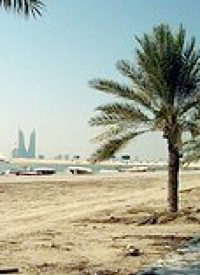
Emboldened by the fall of Egyptian President Hosni Mubarak, a key ally of the United States, other pro-American regimes in the region are quickly coming to realize that their countries are not immune to the revolutionary fervor that has swept through the Middle East. In Bahrain, protests to topple the monarchy continue today, as protesters mourn the deaths of five fellow demonstrators killed the day before in a violent clash with the kingdom’s military.
Ruled by King Hamad bin Isa Al Khalifa since 1999, Bahrain is an absolute monarchy. Before him, the country was ruled by his father Emir (a high title of nobility in the Muslim world equivalent to sheikh or other high ruler) Isa bin Salman Al Khalifa from 1961 to 1999.
The Bahraini monarchy is ruled by the House of Khalifa — the ruling family since Ahmed ibn Muhammad ibn Khalifa came to power in 1783 as Bahrain’s first H?kim or monarch.
The Bahraini people have never known political freedom as some of their fellow Arab neighbors have, and after seeing that a revolution can topple a longstanding powerful ruler such as Mubarak, many in Bahrain see this as their opportunity to overthrow the monarchy and establish a free democratic society.
As with the recent events in Tunisia and Egypt, the United States has been careful not to interfere too much, hoping to be on good terms with the government -— whoever that may be once these revolutions subside.
Although a tiny island nation located in the Persian Gulf, off the coast of Saudi Arabia and Qatar, Bahrain is a key strategic outpost for the U.S. Navy. Bahrain’s naval ports are the home away from home for the U.S. Fifth Fleet, which — because of its proximity to Iraq, Iran, and Afghanistan — has played a more important role in the War on Terror and the Iraq War than any other U.S. fleet in the world, and is also responsible for keeping oil shipping lanes in the Gulf secure.
The loss of Bahrain to radical sectarian forces or a government non-sympathetic to Washington will be a major thorn on the side of the Pentagon and especially the White House as it gears up for presidential elections next year.
The loss of Mubarak pales in comparison to the loss of a U.S. Navy fleet base, which would severely debilitate U.S. naval operations and interests in the region as well as throw into doubt prospects for President Obama’s re-election, at least in light of his foreign policy.
There is no doubt to the U.S. defense establishment that Bahrain is vital to American interests in the region. Although the United States is in the business of promoting "democracy" abroad, Bahrain’s protests are looking at the United States less as a source of inspiration and more as an accomplice to their plight.
Despite all of the news reports surfacing from Bahrain, many still remain unaware of what is going on and what forces remain at play.
Although online social media sites such as Twitter and Facebook act as a vital conduit to disseminate information and spread word of what happens where and when, it is the organizational forces behind the scenes that are the primary instigators of revolution — just as in Egypt.
The protests in Bahrain began as an extension of the demonstrations in Egypt. On February 5, 2011, Bahrain’s Gulf Daily News reported that “[h]undreds of Bahrainis took to the streets yesterday in support of the Egyptian people.” The protestors, made up of men, women and children, “showed up in large numbers at a peaceful demonstration.”
The demonstrations were authorized on the previous Thursday night, February 3, by the Interior Ministry after having declined two previous requests.
The report further explained that the demonstrations were “organized by Bahraini political associations and trade unions, rallying behind the demands of Egyptian citizens.”
According to the Gulf Daily News, these political associations included: “Al Wefaq National Islamic Society, Brotherhood Society, National Democratic Action Society (Wa’ad), Islamic Action Society (Amal), Democratic Progressive Tribune, Democratic Gathering Society, National Gathering Society and Islamic Arabic Wasat Society.”
As the names Al Wefaq National Islamic Society, Brotherhood Society, Islamic Action Society (Amal), and Islamic Arabic Wasat Society imply, Islam is a key factor in the Bahrain protests.
The ruling al-Khalifa family subscribes to Sunni Islam while the majority of the population is Shiite Muslims, who feel oppressed by the Sunnis. Shiites claim to be treated like second-class citizens in Bahrain, despite their overwhelming majority in population.
In addition to the religious factor, there is also a leftist political dimension. As the term “political associations and trade unions” would suggest to those familiar with labor movements, this alludes to the participation of socialists and communists.
The socialists and communists are identified as the National Democratic Action Society (Wa’ad) and the Democratic Progressive Tribune, both of which, according to the article, were present at the first protests in Bahrain in lockstep with the Muslims in solidarity with the Egyptian protestors on February 4, 2011.
The National Democratic Action Society (NDAS) or Wa’ad, considered to be Bahrain’s largest leftist political party, emerged from the Popular Front for the Liberation of Bahrain (PFLB) — a Soviet-backed Marxist liberation front during the Cold War. Today, Wa’ad is composed of radicals from all sorts of revolutionary stripes: Maoists, socialist Trotskyites, and other Arab nationalists.
On February 3, a day before the sit-in protests, the Gulf Daily News reported Ibrahim Sharif, the secretary-general of Wa’ad, admitting to their being a collaboration between Islamic and communist forces when he said that “all the [political] associations would meet to discuss their future plan.”
The next day the first sit-in protest occurred and 10 days later massive protests erupted throughout the country.
The Democrat Progressive Tribune is a political association created by returning exiles who were once members of the National Liberation Front-Bahrain, a Marxist-Leninist party founded on February 15, 1955 and rooted in anti-British colonialism and Bahrain’s labor movement.
In an official statement, commemorating the 56th anniversary of its founding, the NLF-Bahrain issued a statement that said in part:
In the same context we express our solidarity with the great uprising of the Tunisian people and its national and democratic, labor and communism, for the elimination of tyranny and injustice and corruption, as a result of the corrupt ruling class, reflected in the system, "Ben Ali" deposed. We also salute the people’s victory, the Egyptian hero in the popular revolution that overthrew the tyrant, Mubarak and his corrupt regime, radical changes in order to secure freedom, democracy, human rights and civil society effective. We also express our solidarity with the struggles and protests of the Arab peoples in the Arab system and undemocratic regimes, like Syria, Libya, Algeria, Jordan, Yemen and others.
… we hope you achieve greater success in the development of activity of the Front and enhance their role in political life and the struggle of national and democratic, to achieve a free and dignified life of the Bahraini people, of freedom, equality and social justice.
It is clear that they seek to build on the successes of both Tunisia and Egypt, hoping to dethrone the Bahraini monarchy.
Even before the cries of protesters clamored for democracy, communists and Muslims together were instigating civil disobedience in the streets pledging their solidarity with the Egyptian Revolution.
The February 4 sit-in was just the beginning. On Monday, February 14, mass protests erupted all across the island nation.
On Friday, February 18, the protests entered their fifth day of rage, following a series of violent crackdowns by the government that began Wednesday night when Bahraini tanks and riot police with tear gas attacked protestors as they were asleep in their encampment at the Pearl Roundabout in the center of Manama — the capital city of Bahrain.
Bahrain’s Interior Ministry spokesman told the press that two civilians had died and another 92 had been injured. Hospital services, however, admit that three civilians were killed during the raid.
In addition to civilians, the Interior Ministry spokesman claimed that 50 security forces had been injured with only one arrest made as a result.
Bahrain’s armed forces gave its own version of events in the following statement that it issued:
The armed forces of Bahrain calls on all citizens to distance themselves from gatherings in vital areas in the capital because this will have a negative impact on traffic and will create fear and shock in the area, and will result in a traffic crisis which will disrupt the daily life of the citizens and endanger their personal interest.
Security forces found several weapons in the encampment, which they say is proof of the protestors’ violent intentions.
In a nationally-televised address to the county, King Hamad bin Isa Al Khalifa called for an investigation to look into claims by protesters of violence on the part of security forces, and went on to stress reforms, but vowed that Bahrain would not follow in the steps of Egypt.
The Bahraini people say that they want not reforms but rather freedom and the ousting of the monarchy.
On Friday night, The Telegraph reported, “[a]s protesters attempted to converge on Pearl Roundabout, a landmark in the capital Manama that has become the principal rallying point of the uprising, soldiers stationed in a nearby skyscraper opened fire.”
The situation is clearly becoming more and more tense by the moment as the army continues its relentless brutality on the people for the sake of the preservation of the monarchy and as protestors both religious and secular leftist continue to demand change. Like Egypt, this is one hot spot to pay attention to as its ramifications may be global.




